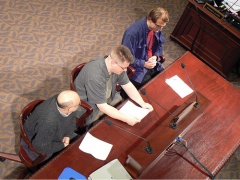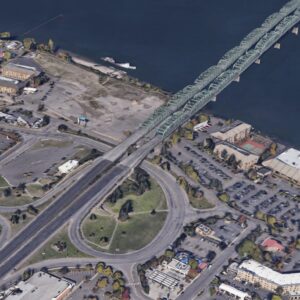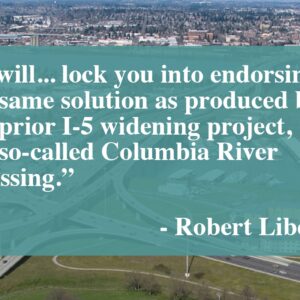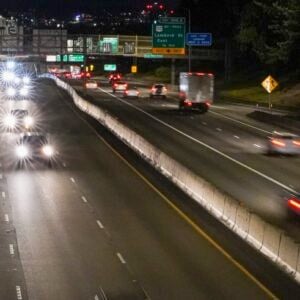[Editor’s note: This guest editorial was written by first-time BikePortland contributor Spencer Boomhower. Spencer testified in front of City Council during a hearing on the Columbia River Crossing held last Thursday.]

I’m sitting at a table with a microphone sticking in my face, and a little digital counter telling me how much time I have to talk. Or rather, telling the guy to my right how long he has to talk; I’m up next, after him. I recline in the polished wooden chair, cast my eyes down, and try to relax.
I look up and I’m faced with a who’s-who of local-politics luminaries straight out of my voting guide: Randy Leonard, Amanda Fritz, Sam Adams, Dan Saltzman, and Nick Fish. This doesn’t help.
I’m about to give testimony in front of the Portland City Council, on the Columbia River Crossing I-5 bridge project. The council is meeting to receive public testimony on the number of lanes for the proposed bridge.
“I have a devotion to sustainable communities, and the nagging feeling that pouring several billion dollars into yet another piece of massive highway infrastructure is a Really Bad Idea.”
I came to this meeting to contribute my two cents, but seeing the VIP status of the many people testifying – the business leaders, the community leaders, the union leaders – and seeing how many of them there are (over 60, the clerk at one) makes me hesitate. In part because of my relative lack of preparedness. Oh, and my stage fright. And then there are the other speakers. I mean, these people have written down what they’re going to say! And they have suits!
Myself, I’m no pro. I just find this stuff wildly interesting because I have a devotion to sustainable communities, and the nagging feeling that pouring several billion dollars into yet another piece of massive highway infrastructure is a Really Bad Idea. That and another nagging feeling which tells me that this deserves my attention, despite the fact that I hardly ever use the current CRC, comfortably and safely ensconced as I am in my pleasant Southeast Portland Neighborhood.
So I switch into observer mode, making rough notes of the testimony: for and against, salient points, and how many lanes they favor.
There’s solid support in the room for a 12-lane CRC. With transit, with bike and pedestrian facilities to be sure, but make no doubt about it, TWELVE, that’s ONE-TWO, lanes. Anything less would be unthinkable.

These folks have some compelling testimony. They haul cargo, and are stuck for hours trying to cross the bridge. They are EMTs, and they’re stuck for hours trying to cross the bridge. Their livelihood — and by extension, ours — depends on their being able to get from point A to point B on time, but — you guessed it — they’re stuck for hours on the bridge.
One gentleman who lives on Hayden Island jokes that the over 50% of residents over age 60 on the island time their heart attacks so as to not coincide with the impenetrable rush-hour traffic.
The day’s testimony is skewed, as you might expect, toward people living up around the crossing, and/or who are severely impacted by the shortcomings of the current bridge. I don’t see many of my Southeast Portland neighbors represented here. I stop taking notes after the 42nd speaker, but my tally up until then is: 34 wildly in favor of the 12-lane option.
There are some impressive speakers on the smaller-bridge side of the argument, despite their being distinctly in the minority. CRC critics include economist Joe Cortright and businessman Ron Buel (who had an opinion piece on the project in last Sunday’s Oregonian).

in 2008. (Photo: Matt Picio)
These two are among the few speakers who are challenged and questioned by the council. This is notable, coming as it does after the many 12-lane proponents made their cases to a mostly impassive council. Cortright and Buel seem a little taken aback by the challenges. Commissioner Nick Fish is quick to point out that as such high-profile speakers that it’s assumed they can withstand the challenge.
The clerk calls my name, and the counter resets: I’m on. I start talking, more or less hitting my talking points, though I’m distracted by a fluttering motion on the big video screen above my head. The commissioners look like they want to go home, which is understandable, considering it’s three hours in, and I’m the final speaker. At least they’re not asking me questions!
All jitters and unpreparedness aside, I’m glad I testified, even if I only got out a fraction of what I wanted to say.
I encourage others to speak up also. The CRC has huge implications for sustainable development, transportation planning, and allocation of funds that will impact Portland cyclists from multiple directions, for years to come. Those of use who will be affected by the project — and that’s pretty much all of us — need to get our say in while we still can.
— Metro will hold a public hearing on the CRC on Thursday, February 5 at 2:00 pm (600 NE Grand Ave.). Portland City Council is scheduled to make their decision about the number of lanes on February 25th. Browse our previous CRC coverage here.





Involvement by citizens like you is what has made Portland a great place to live, Spencer. It’s what defeated the Mt Hood Highway. It’s what will defeat this new subsidy for single-occupancy vehicle traffic and private freight.
Note that the major argument by the pro-CRC crowd is that they want a wider bridge because the traffic is bad now. Their argument assumes that more lanes = less congestion. This is patently FALSE.
Great article and cool insight on what goes on at the city council. Hope to see more articles on BikePortland from you Spencer.
is it true that we can send in our testimony if we are unable to attend the hearing on feb. 5?
I moved to Portland about a year and a half ago from Memphis TN.
Memphis, of course, is a major transportation hub for truckers traveling I-40, and the city is the point at which all of that traffic crosses the Mississippi River. It’s one of the biggest, most-used spans across the river. Thousands of cars and trucks cross it every single day. The typical speed for vehicles on the bridge itself is in excess of 70 mph. It’s one of the few links for traffic from the east to the west, channeling half a content’s worth of goods and people from one side of the river to the other. Which is all a roundabout way of saying that it’s a very important bridge, and it gets used a LOT.
And it’s six lanes wide.
Traffic backups on the Memphis I-40 bridge do happen, but not often — no more than they do on any other random patch of freeway. On any given day, at just about any time of day, a Memphis driver would approach the bridge with the expectation that they’ll be able to drive across it unimpeded.
It seems to me that the major difference between our Columbia River crossing and Memphis’ Mississippi bridge isn’t a question of width — the I-40 bridge seems to prove that six lanes can do the job very adequately. The difference is more to do with the structure of the ramps on either side of the bridges, and the way cars access and leave the flow of traffic. That, more than the capacity of the bridge itself, is what’s causing frustration on the CRC. And creating more lanes isn’t going to fix a problem rooted in the surrounding infrastructure. Given the density around the CRC, it’s possible that a real fix on the bridge isn’t feasible. I can say that the I-40 bridge lets out directly into downtown Memphis on the eastern end, so it doesn’t seem that density in and of itself is an insurmountable obstacle.
Anyway, my point is, having seen bridges that function much better at a similar size, I’m skeptical that adding lanes is going to do much to address the congestion problems on the CRC.
I want MAX to cross the I-5.
Safe Bike/ Ped bridge across as well.
$4 minimum on the I-5 AND the 205 to cross INTO Oregon.
No lane expansion.
6 lanes now. 6 lanes later.
Extra lanes= more cars = more congestion = more lanes = more cars = more congestion = more lanes = more cars = more congestion = more lanes = more cars = more congestion = more lanes = more cars = more congestion = more lanes = more cars = more congestion = more lanes
How do you think we got so many lanes right now, anyways?
Just how it is testifying before Council. Excellent piece!
If it were truly about “freight” as they say, then they would make it better for freight – not for commuters from Vancouver.
If it is about freight, turn one of the current lanes into a HOV lane ALL THE WAY THROUGH THE ENTIRE AREA 24×7 and allow trucks to use it too. (From I84 to SR500)
If it is about “merging and weaving” from the on/off ramps then make a small local arterial bridge, and close the ramps to I5 for all but emergency vehicles. Get the “local” traffic off the “interstate”. (You can include bike/ped/LRT on this brige too).
ANY OTHER SOLUTION DESIGN IS ABOUT MOVING SINGLE OCCUPANCY VEHICLES FROM VANCOUVER. No matter what lies they make up.
Remember – 12 lanes today can be re-striped to be 14 or 16 lanes tomorrow. There is a historical precedent in doing this…
Thanks for the comments, and thanks a ton to Jonathan and Elly at BikePortland. This site is a tremendous service to the community, both as a source of news, and as a place to have a conversation on these issues that are so near and dear to us.
This site is where I first heard about CRC, and the comments section is where I first had a chance to really talk about it. To now have a story up on the front page is a thrill and a half.
My concern with the CRC is that we’re headed headlong into “how many lanes?” territory without, it seems, having stopped to take in the scenery in “is this really such a good idea?” territory.
The debate, such as it is, seems to be driven by those who have the most to gain, and the least to lose from the big-bridge option. Which is understandable when you hear the stories of those who are stuck with the crossing as a central part of their day-to-day lives. It sounds like hell, and you can see why they would come out in droves to support the biggest bridge possible.
Yet it’s that very impulse to build big, to build with endless expansion in mind, that’s behind sprawl, and car-dependency in general. This is the last thing we need in a world in which the end of cheap and easy oil is in sight, and in which global climate change is reaching a point of no return.
So why are so many people stuck having to cross this thing? Why are we cramming the all-American, suburban, home-work-shopping migratory pattern through this tiny chokepoint? Why not figure out ways to help people get what they need on their side of the bridge? Maybe even wihin walking distance of their homes? I’m talking jobs, shops, schools, libraries, whatever. Wouldn’t it be better to encourage that kind of development? Couldn’t it yeild the same dividends as a big freeway bridge, while also making sense within context of the petroleum-constricted world we’re entering?
A couple months ago I biked up to the CRC open house they had at the Expo Center, near the crossing. I asked a guy there why they didn’t have any open houses closer in to Portland, like downtown or something. He told me that the CRC was expected to impact only the project area – a few miles north and south of the crossing – and would not impact Portland. The implication being that he did not think it would be of interest to Portlanders.
I respectfully disagree!
I would think it would be of tremendous concern to Portlanders, if only based on the fact that this bridge seems like it could dump way more traffic into the already congested section of I-5 that goes through the Rose Quarter, and our already car-choked downtown.
Tolling might be an option to reduce congestion over the bridge, but tolling requires the will to toll. If that will existed, wouldn’t we have started tolling already?
This project is a big deal. It’ll easily impact the area for the next 100 years, and whatever form it takes, it will be a gateway into both Oregon and the Columbia. It deserves a bigger conversation than the one we’re having.
A good place to start is the link to Ron Buel’s opinion piece in the Oregonian, and pretty much anything Mr. Buel and Joe Cortright have to say on the matter.
we’ve got to STOP the twelve lane option. has a dynamic congestion lane ever been discussed for the crc? in addition to the basic toll to drive the bridge, people in a hurry or services that need do, pay to use the congestion lane where free-flow is guaranteed via the dynamic pricing. so off-peak it costs no more to drive in the congestion but during peak travel, the price goes up for the congestion lane. it seems like we could address the legitimate concerns of the freight and transport industries and emergency services without building an expensive twelve lane bridge.
One thing I’d recommend that anyone do, that ever thinks they might testify in front of city council, is go do it once on some cause that you aren’t heavily invested in. In other words, practice. Because when the day comes that your cause is on the line, you’ll want to know that you should have a prepared script, that you may get either 2 or 3 minutes, that you should probably pretend to dress up, etc…
Thank you for caring and testifying, and for writing about your experience. Sometimes the first-time testifiers are the most effective, as listeners appreciate you coming into the process.
I’m new to the City Council, but I spent seven years listening and responding to citizen comments while serving on the Portland Planning Commission. After I left, I wrote up several pages of testimony tips. Some I’d revise if I had time, and the email address listed is no longer active, but you may find them helpful.
Bravo for taking your 2 minutes last week in front of City Council.
I-5 is congested about 10% of its total operational time; 90% of the time its fine…freight moves, cars shoot along.
The irony is all these proposed extra lanes are to get local traffic on and off the freeway, when they should really be (and many drivers would happily be) on a local bridge, a “Broadway Bridge.”
Check out more about options to the CRC proposal on http://www.smarterbridge.org
I congratulate you for testifying. But even more for having the stomach to listen to some really absurd commentary. I went there early on but left after a short time realizing that it was getting silly. But I did make sure to leave written commentary including the point that a new bridge which rises several stories above the water would be an impediment to both casual cyclists and MAX trains. The better option would be a flat bike/train bridge with a lift span.
Written comments are weighted the same as spoken ideas.
#10 Matthew Denton,
Good advice.
My biggest problem was unpreparedness. I went there thinking I could wing it, then chickened out, then felt sick at the thought of chickening out when I saw that huge chunks of Portland – including my own – were hardly represented in the testimony.
If I had it to do over again, I would probably:
1) Write a script – Certainly, working from notes works for some, and natural, improvised speech is more appealing to listen to. But writing down exactly what you’re going to say lets you make sure you respect the formalities – like addressing the councilors properly – and get all your points in while you also:
2) Make sure everything fits within the time limit. Matthew, your 2/3 minute advice is extra appropriate because at this one meeting the time limit was shortened from 3 to 2 minutes when they saw how many people were signed up.
Once I had a script, I would:
3) Practice
4) Practice
5) Practice… In front of a video camera probably, so as to better time the comments. And to get perspective on how I’m coming across.
I think that must be how the pros do it! Certainly, most of them read from scripts.
For an example of really excellent testimony, everyone should check out today’s article on Michelle Poyourow of the BTA:
http://bikeportland.org/2009/02/03/its-not-about-bikes-bta-testimony-on-the-crc/
Michelle’s testimony was a standout that day; it was well-written and effectively presented. She even managed to work in a joking (and, I assume, improvised) reference to a previous speaker’s story about how he learned when he was a child to get shoes a little too big so he could grow into them, and still does. That last part got a double-take from the council. (Actually, that might be an apt metaphor for the CRC planning process itself: preparing for growth of a sort we might very well not want.)
#11 Amanda Fritz (!),
While it says in this version of the story, “they (the councilors) look like they want to go home,” that’s not entirely accurate; I’d say you were the exception. In an earlier, wordier version of the story, I wrote how grateful I was that you smiled encouragingly during my testimony. You obviously value public input, and I appreciate that.
I took a quick look at your tips, and I’m sure they’ll be a tremendous help the next time I attempt something like this.
Freight freight freight.
Yeah that’s nice. Even though I most definitely support a dedicated HOV lane, at the expense of people taking the cheap easy suburban way out by moving to Vancouver then commuting through my neighborhood twice a day. However the The trucking companies are obscuring the fact that we have world class port facilities right here in Portland.
Yes, the billions of dollars invested in the Port of Tacoma in the last 10 years has made it the ‘low-cost’ option. But why should we spend our tax dollars and destroy our health and quality of life becoming willing partners in the growth of Port of Tacoma at the expense of Portland shipping jobs?